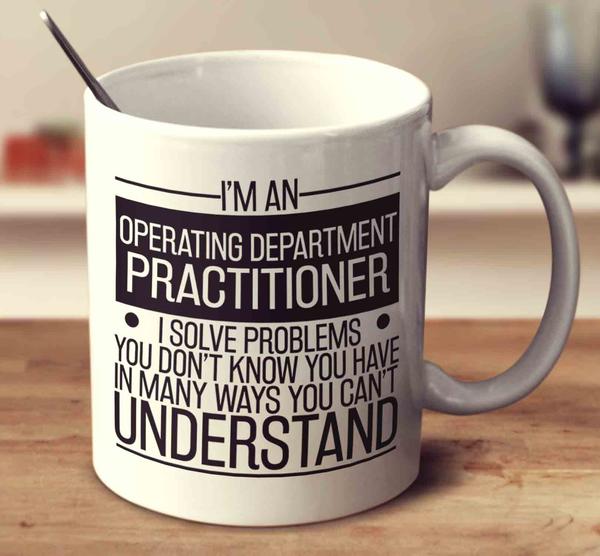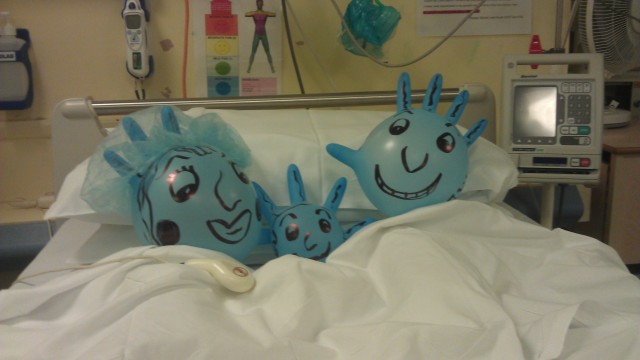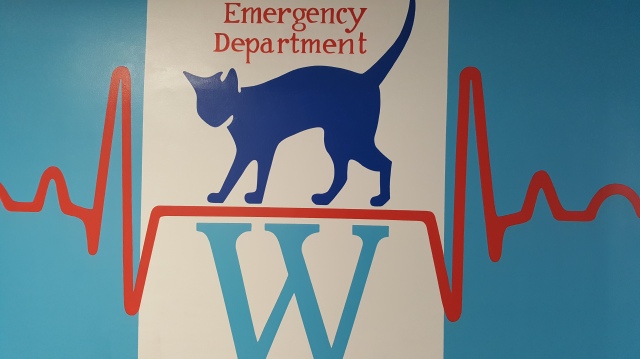The questions I get asked most frequently are: “So, is it really like on the tv then?” and “What is an Operating Department Practitioner (ODP)?”
In answer to the first, I can safely say that there are days when it is just like tv. At 3am, I’ve been pulled out of bed to attend the Resuscitation room for life-threatening emergencies, alongside an anaesthetist. The cause might be an accident, overdose, heart attack or stroke. It might be a child or a pregnant woman. They all need you to be the best you can.
You’ve generally slept in a set of scrubs, so you pull your shoes on, grab your ID, pen/scissors and arrive almost before you’re awake. While listening to a team briefing of the patient’s status, you get airway equipment ready and run drips and an arterial line through, as needed. Then stand by until the patient arrives, and my role is to assist the anaesthetist with securing the airway and whatever else might be needed.

Operating Department Practitioners are allied healthcare professionals who receive training in all areas of Operating Department Practice – Anaesthetics, Scrub and Recovery. Most courses take three years, and alternate university time with placements in the clinical area in order to put theory into practice as you develop. ODPs work alongside doctors, nurses, healthcare assistants and members of the theatre team, to care for patients safely in all areas of the operating department.
Operating Department Practice has evolved greatly, particularly over the last twenty years. The original ODPs were the Operating Theatre Technicians. Generally male, these technicians were the backbone of theatre maintenance, maintaining stock levels and equipment, moving theatre lights, helping position patients on the operating table and changing cylinders. As the role expanded and the profession moved more towards formalised third level education, instead of in-house training, the Operating Department Assistant evolved. In the late nineties, this became the Operating Department Practitioner course, which is now degree level. Registration, with the UK Health and Care Professions Council (HCPC), once voluntary, is now statutory.
ODPs, once confined to the operating theatre, now work in a wide variety of areas. In addition to working in and sometimes running operating departments, they can be found in Resuscitation teams, Transplant Retrieval teams, the Intensive Care Unit, in research and in Medical Physics teams.
One of my previous jobs was working exclusively in a Labour Ward operating theatre and the Recovery/High Dependency area. This was a varied role – sometimes I would scrub to hand instruments to surgeons carrying out a caesarean section, and other times I would be caring for unwell or postoperative women in the Recovery area. It also involved attending emergencies within Maternity, such as massive bleeding, or pre-eclamptic women who needed to be stabilised before going to theatre to deliver their baby by caesarean section.

Another previous role involved running a stand-alone pair of operating theatres, with anaesthetic rooms and a four bedded Recovery area.
If an emergency happens anywhere in my operating theatres, I will attend immediately, provide whatever assistance is needed and co-ordinate getting extra help or transferring the patient.
The other part of the role can be co-ordinating Main Theatres. This involves ensuring that all lists are fully staffed, dealing with problems and staff rota queries as they arise, as well as putting staffing in place to cover the following week’s activity. This can also involve co-ordinating the emergency theatre list, liaising with doctors to decide upon the urgency of booked cases and ensuring that patients get the earliest available slot for their operation.
Anaesthetics is the area in which I presently work. After picking up the keys, I go to my assigned operating theatre and check anaesthetic machines, drugs and safety equipment, run drips through and prepare anything else that might be needed for that particular operating list. In Thoracics/ENT you will often need a intubating bronchoscope. In Orthopaedics, an ultrasound for the anaesthetist to perform localised nerve blocks.
If you are holding the cardiac arrest bleep, you do not know what the next moment might hold, but also might spend the day just checking equipment, cleaning trollies and giving lunch breaks. Or you might find yourself helping to intubate a patient, taking them to the CT scanner, anaesthetised, and preparing them for transfer.

I have yet to meet a patient who is not nervous in some way or another about their operation. It doesn’t matter if it’s removing a mole, or a Coronary Artery Bypass Graft. Every patient has their fears, which sometimes manifest in strange ways. This can range from the “Will I wake up again?” through to “What will it look like after surgery?” to everything you can think of in between.
Every patient I meet, I greet them, introducing myself and try to put them at their ease. Some people handle their nerves better than others, and are able to have a chat and maybe laugh at whatever funny anecdote you try that day. Others are past that, and the thing to do is make it all as painless as you can and help pop them off to sleep as quickly as possible.
The first job I had was as a healthcare assistant (HCA), learning the most basic operating department tasks. In addition, I used to function as a porter taking patients to and from theatres. The ward nurses looked like they had never seen a female porter before.
The first on call has never been forgotten, as it was an absolute baptism of fire. The emergency list was heaving that night and patient after patient came through the department.
Trials aside, I am lucky enough to be able to say that I love what I do. The current challenges the NHS is facing have changed the working environment considerably.
The thing that does not change, is that we are there to care for patients safely and compassionately, no matter what our title.
Further information here: http://en.wikipedia.org/wiki/Operating_Department_Practitioners
#OperatingDepartmentPractitioners #ODP #OperatingDepartmentPractice #NHS #Identity #NationalOperatingDepartmentPractitionerDay2018 #NationalODPDay2018 #FirstEverNationalODPDay #nhsmillion #saveournhs

very iinteresting